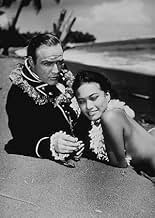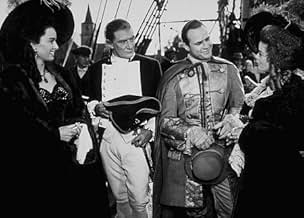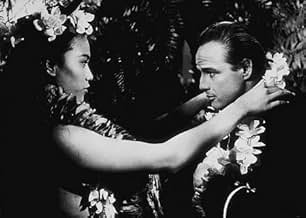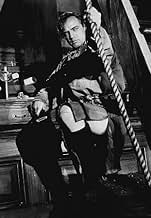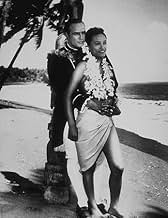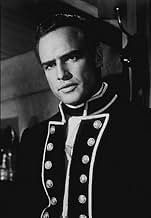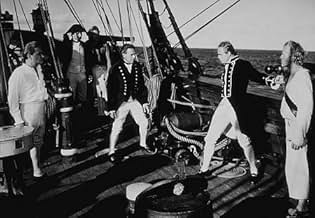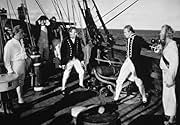En 1787, le navire britannique Bounty quitte Portsmouth pour apporter une cargaison de fruits à pain de Tahiti, mais les conditions de bord brutales déclenchent une mutinerie menée par l'off... Tout lireEn 1787, le navire britannique Bounty quitte Portsmouth pour apporter une cargaison de fruits à pain de Tahiti, mais les conditions de bord brutales déclenchent une mutinerie menée par l'officier Fletcher Christian.En 1787, le navire britannique Bounty quitte Portsmouth pour apporter une cargaison de fruits à pain de Tahiti, mais les conditions de bord brutales déclenchent une mutinerie menée par l'officier Fletcher Christian.
- Réalisation
- Scénario
- Casting principal
- Nommé pour 7 Oscars
- 3 victoires et 13 nominations au total
Avis à la une
I can understand that some viewers balk at Marlon Brando's affected foppishness. IMO, however, the actor is taking a calculated risk in attempting to illustrate the profound transformation that Fletcher Christian undergoes as the story progresses. It does not always ring true, but, taken as a whole, it works very well. Some moments are brilliant. By the time we reach the actual mutiny, his growing rage (which has been suppressed almost imperceptibly up to this point) explodes in a massive rush and instantly we see a side of Christian that we weren't quite sure existed. His self-serving has finally given way to inevitable sympathy for the much-abused crew and even a sort of new-found idealism.
However, it is Trevor Howard's performance as Lt. Bligh which is the backbone of this movie. This man IS Bligh. At first he seems approachable and even affable, but each succeeding scene reveals some new brush stroke of character that illustrates the single-minded, ruthless soul of stone contained within. Howard also has this playfully mischievous smile that, every now and then, leads you to believe that there may be some glimmer of warmth inside the man. This hope, of course, is dashed to pieces every time.
"Mutiny on the Bounty" is also a strong example of how a soundtrack can make a film. This music always gives me goosebumps. From the overture through intermission to closing, it sets the tone of the picture brilliantly as a seafaring drama/adventure. It sounds like the ocean. It sounds the way the cinematography looks. Vast panoramas of blue ocean, endless skies, lush green tropical islands, and, most of all, the ship itself (which was built specifically for this film). And the icing on the cake is the song "Follow Me", one of the most hauntingly beautiful melodies ever written for the screen. To me (here I go again), it sounds like Tahiti.
Watch "Mutiny on the Bounty" in letterbox and full stereophonic sound and THEN see if you don't like it.
When I many years later decided to buy it on VHS and watch it concentratedly, I fell in love with it immediately. I have always been a fan of large-scale films like Ben Hur, Doctor Zhivago and Lawrence of Arabia and Mutiny is definitely a "large-scale" film. Not only boasting a wide variety of colourful locations, from breathtaking, sun-drenched sea vistas to exotic beachscapes on Tahiti, it also includes some great actors, such as Marlon Brando, Richard Harris and Trevor Howard as the despicable captain Bligh. Contributing to the "large-scale" feel is Bronislau Kaper's lush and magic music score, featuring haunting chorus statements of the main theme, interestingly entitled "Follow me". The music was so lovely that I had to try out the theme on the piano once I finished watching the film.
I suppose most readers of this post are already familiar with the basic plotline, so I will not have to go through that.
I find that the film contains quite a lot of nice dialogue that sticks in your memory. But it is above all the growing conflict aboard the ship that is the major interesting theme of the film. Just to see how the conflict between Bligh and Christian builds step by step, from more or less nothing to mutiny. Even though it is unpleasant, it is a delight to follow. In any case, it had me glued to the screen.
I cannot say whether the events are portrayed authentically as they happened historically or not, but to me that is of minor interest. The film comes out magnificent all the same and appear to me to be quite realistic.
Another thing about the film that appealed to me is that it is so beautiful. Not only are the locations beautiful, but a lot of the actors, their contemporary clothing, not to mention the Tahitian beauties, are simply eye-catching. The Bounty, the ship itself, is also quite something else. A lot of the film's beauty, I believe, also has to do with good photography thoughout. The film lends itself incredibly well to widescreen-viewing.
I would heartily recommend this film to any fan of cinema. It is a film filled to the brim with colour and spectacle with marvelous actors and a catching and disturbing story of power abuse and the British Empire in its heyday. The only disturbing thing at the moment of writing, is that it still has not been released on DVD. But when it is, I sincerely hope it comes in a deservedly magnificent picture- and sound-transfer including a mountain of extras. I simply cannot wait.
All of these elements help to elevate the core story in Mutiny on the Bounty: Bligh and Christian. As Bligh, Trevor Howard changes the character immortalized by Charles Laughten in the 1935 version. Instead of inhuman, demonic tyrant, Howard portrays Bligh simply as an excruciatingly stern captain focused(a little overzealously) on doing the best job that he can. If his mean do not pursue his goals with the same fervor. He gets impatient then frustrated then angry and then violent all in quick succession. He makes for a very realistically workaholic without a life, and he wants everyone else to be a workaholic, too. I thought Clark Gable's Fletcher Christian could not be topped...until I saw Marlon Brando undergo a sheer transformation playing the role. After seeing Brando in ON THE WATERFRONT and the equally American THE GODFATHER, I could not imagine him playing 18th Century British officer...but he did. Brando perfects the haughty, posturing walk. He perfects the clipped, accented speech. He perfects the foppish, effeminate walk of a "true" English gentlemen of high-born connections. Brando does it so remarkably well that one cannot imagine such sissified character leading a mutiny against a tyrannical man like Bligh. Brando's transformation of Christian from sissy to mutiny leader baffles. Unlike Gable, he doesn't gloss over the decision to be a mutineer. Gable made it look easy and as the "right thing to do". Realistically, is it the right thing to do? To throw away your career that you worked hard for? To throw away your life? All for the sake of a feeling a moral belief? It may sound hard, but when faced with a such a delimma, it can be agonizing...which is exactly what Brando captures to a tee, right down to the last frame.
Mutiny on the Boutny 1962 truly needs to be seen. Please don't listen to critics. This movie is fantastic.
Le saviez-vous
- AnecdotesThe ship built for the film sank in the Atlantic Ocean after taking on water on October 29, 2012 during Hurricane Sandy off of the East Coast of the United States. It was last seen with only the masts standing above the water. Two of the crew died: the Captain, Robin Walbridge, and Claudene Christian, the direct descendant of Fletcher Christian.
- GaffesThe actual mutiny did not happen in the manner portrayed in the film. Christian and the other mutineers actually took the ship in the early hours of the morning, while Bligh and almost everyone else was asleep.
- Citations
Fletcher Christian: [to Captain Bligh] You remarkable pig. You can thank whatever pig god you pray to that you haven't turned me into a murderer.
- Versions alternativesThe original 1962 print had a different opening scene, in which a ship's crew lands on Pitcairn and discovers an artifact belonging to the H.M.S. Bounty. They can barely read the name until William Brown (Richard Haydn), now aged, appears on the beach and says "Bounty". He then proceeds to tell the story of the famous mutiny, of which he is apparently the last surviving member. That is why we hear his voice narrating the story. In all current prints, including the one shown on Turner Classic Movies ca. 2005, this opening scene is omitted, so we do not know why Brown is telling the story in voiceover. However, the scene has been restored on the 2006 DVD release.
- ConnexionsFeatured in Hollywood: The Fabulous Era (1962)
Meilleurs choix
Détails
- Date de sortie
- Pays d’origine
- Langues
- Aussi connu sous le nom de
- Motín a bordo
- Lieux de tournage
- Bora Bora, Leeward Islands, Polynésie Française(first breadfruit collecting party)
- Société de production
- Voir plus de crédits d'entreprise sur IMDbPro
Box-office
- Budget
- 19 000 000 $US (estimé)
- Durée
- 2h 58min(178 min)
- Rapport de forme
- 2.76 : 1


